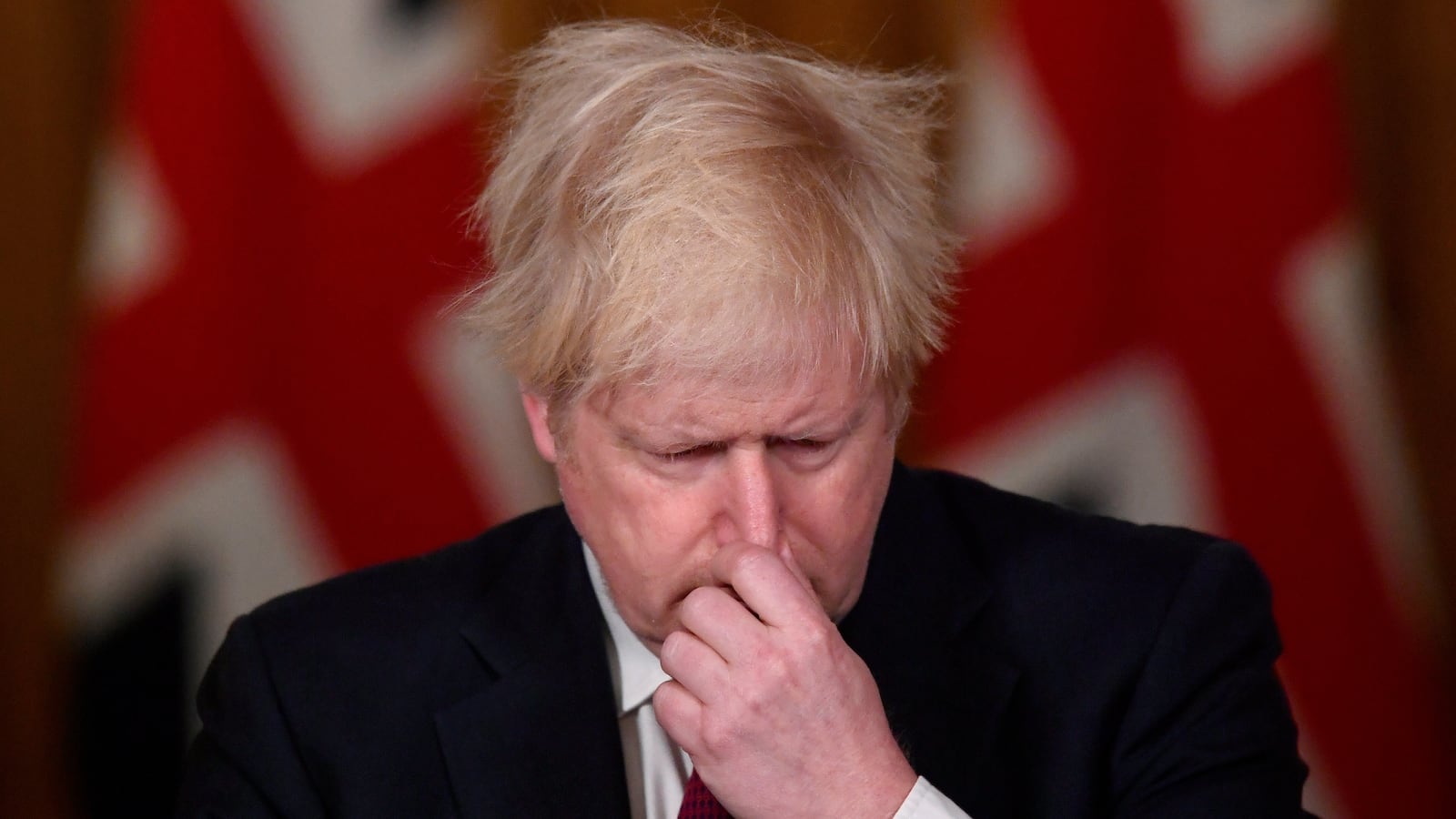EDINBURGH, Scotland—On Jan. 2, Boris Johnson was feeling pretty good about himself. Having just secured a massive majority in last year’s festive election, the British prime minister posted a thumbs-up photo of his grinning face with the caption: “This is going to be a fantastic year for Britain.” As 2020 draws to a close—with a mutant virus running riot through his country, Christmas canceled for millions, Brexit negotiations deadlocked, and nations around the world banning any kind of travel from Britain—it’s fair to say that Johnson’s prediction was somewhat wide of the mark.
Britain is in an unparalleled state of crisis. Johnson’s horrifying weekend television address, when he revealed a new, seemingly faster-spreading strain of the coronavirus was tearing through London, has had a domino effect around the world. More than 30 nations have slammed their doors shut to incoming British travel—most seriously, France has closed its U.K. border for two days, meaning no commercial transport of cargo can make its way in from Europe, raising fears of immediate food shortages days before Christmas.
As of Monday morning, France, Germany, Italy, Denmark, the Netherlands, Ireland, Austria, Portugal, Sweden, Belgium, Bulgaria, Turkey, Switzerland, Canada, Hong Kong, Israel, Iran, Croatia, Argentina, El Salvador, Chile, Morocco, Kuwait and Saudi Arabia have all announced bans. No action has yet been taken in the United States—though New York Gov. Andrew Cuomo has demanded new federal restrictions to stop British flights from streaming in to New York City’s airports.
But experts fear it could be too late to stop the mutant strain of COVID racing around the planet.
Many questions about the British variant of the virus remain unanswered. Since the pandemic took hold in March, the world has learned largely what to expect from the coronavirus—but now the rulebook is being frantically rewritten in Britain, where people are facing a mutated virus that appears to be much better at infecting people. There is no evidence to suggest that the mutation makes a COVID infection more deadly, but just increasing transmission would be enough to strain the country’s already-creaking hospitals.
There’s also no evidence to suggest that the approved vaccines won’t work against the mutation, but that doesn’t mean scientists aren’t concerned about that prospect. Ravi Gupta, professor of clinical microbiology at the University of Cambridge, told BBC News: “If we let it add more mutations, then you start worrying... This virus is potentially on a pathway for vaccine escape, it has taken the first couple of steps towards that.” U.S. Army scientists are carrying out their own tests to ensure that the vaccine is still effective against the British strain.
This isn’t just a British problem—despite the travel restrictions, experts have suggested that the British strain appears to be so fast-spreading that it may become the dominant strain globally. Prof. Calum Semple, who sits on the British government’s advisory group, said the strain is “causing more disease more rapidly” and that it will likely “out-compete other strains” to become the most common one across the world.
The effect of the mutation is already making itself clear in Britain. New coronavirus cases in the U.K. rose by 35,928 on Sunday, nearly double the number recorded seven days before. Health Secretary Matt Hancock told the nation Sunday that the strain was “out of control.”
Johnson is set to chair an emergency-response meeting on Monday to discuss the unprecedented peacetime disaster. It could not come at a worse time—many British companies were already engaged in frantic stockpiling before Dec. 31, when the Brexit transition withdrawal period with the European Union ends and new customs rules come into force. It’s still unclear what those rules will be, with British and European negotiators having failed again to reach an agreement over the weekend. Johnson said during the Brexit referendum that Britain would not leave without a deal, but that promise looks to be verging on collapse.
The disastrous timing has also caused heartbreak for millions. Johnson had insisted as recently as last Wednesday that the planned five-day window for Christmas mingling across the United Kingdom would go ahead. That day, facing calls from the opposition to abandon the plans, he ridiculed the idea and said he wouldn’t dream of canceling Christmas. Three days later, he told people in London they wouldn’t be allowed to visit friends and family. The rest of the country had their visiting window reduced to Christmas Day alone—though the government has urged people not to use it.
Labour Party leader Sir Keir Starmer has accused Johnson of “gross negligence” over his prevarication, saying that the need to restrict the relaxation of rules over Christmas had been “blatantly obvious” for weeks. Starmer repeated a criticism leveled at Johnson throughout his career—that he put off having to make an “unpopular” decision until it was way too late. Videos of packed London train stations on Saturday night, hours before new travel restrictions came in, suggest he is right.
It’s obvious that this has not been a “fantastic year for Britain”—and the 10 remaining days of 2020 are on course to be the worst of the lot.





